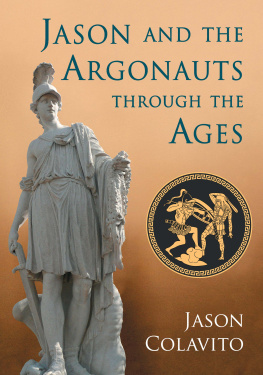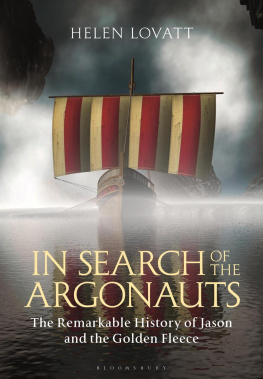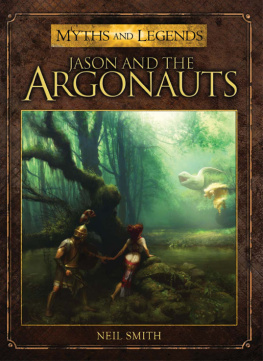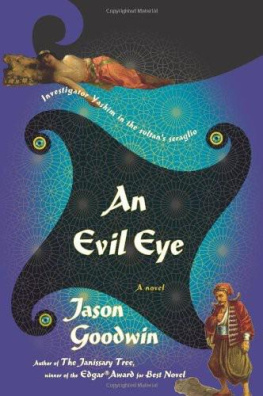Jason Colavito - Jason and the Argonauts through the Ages
Here you can read online Jason Colavito - Jason and the Argonauts through the Ages full text of the book (entire story) in english for free. Download pdf and epub, get meaning, cover and reviews about this ebook. genre: Romance novel. Description of the work, (preface) as well as reviews are available. Best literature library LitArk.com created for fans of good reading and offers a wide selection of genres:
Romance novel
Science fiction
Adventure
Detective
Science
History
Home and family
Prose
Art
Politics
Computer
Non-fiction
Religion
Business
Children
Humor
Choose a favorite category and find really read worthwhile books. Enjoy immersion in the world of imagination, feel the emotions of the characters or learn something new for yourself, make an fascinating discovery.
- Book:Jason and the Argonauts through the Ages
- Author:
- Genre:
- Rating:3 / 5
- Favourites:Add to favourites
- Your mark:
- 60
- 1
- 2
- 3
- 4
- 5
Jason and the Argonauts through the Ages: summary, description and annotation
We offer to read an annotation, description, summary or preface (depends on what the author of the book "Jason and the Argonauts through the Ages" wrote himself). If you haven't found the necessary information about the book — write in the comments, we will try to find it.
Jason and the Argonauts through the Ages — read online for free the complete book (whole text) full work
Below is the text of the book, divided by pages. System saving the place of the last page read, allows you to conveniently read the book "Jason and the Argonauts through the Ages" online for free, without having to search again every time where you left off. Put a bookmark, and you can go to the page where you finished reading at any time.
Font size:
Interval:
Bookmark:

Also by Jason Colavito
Knowing Fear: Science, Knowledge and the Development of the Horror Genre (2008)
Edited by Jason Colavito
A Hideous Bit of Morbidity: An Anthology of Horror Criticism from the Enlightenment to World War I (2012 [2008])

McFarland & Company, Inc., Publishers
Jefferson, North Carolina
LIBRARY OF CONGRESS CATALOGUING DATA ARE AVAILABLE
BRITISH LIBRARY CATALOGUING DATA ARE AVAILABLE
e-ISBN: 978-1-4766-1566-0
2014 Jason Colavito. All rights reserved
No part of this book may be reproduced or transmitted in any form or by any means, electronic or mechanical, including photocopying or recording, or by any information storage and retrieval system, without permission in writing from the publisher.
On the cover: Statue of Jason, Schnbrunn Palace, Vienna (Dreamstime); inset graphic 2014 iStockphoto
McFarland & Company, Inc., Publishers
Box 611, Jefferson, North Carolina 28640
www.mcfarlandpub.com
When I was young, I found an old copy of Edith Hamiltons Mythology, and I was immediately taken by the story of Jason and the quest for the Golden Fleece. Later, I read the account of the same journey in Bulfinchs Mythology, and I wondered why the details did not entirely match. Additional investigation in other collections of the Greek myths yielded similar results. Sometimes Jason seemed the hero of the story, sometimes almost the sidekick to Medea. Sometimes Jasons father Aeson is overthrown by Pelias, but sometimes he surrenders power voluntarily, or was never king at all. Sometimes Pelias forces Jason to undertake the quest for the Fleece, but sometimes the idea comes from Jason, or Hera. Even the details of the voyage of the Argo did not agree. Did Jason and his companions travel to Aea or to Colchis? The general outline of the story remained, but the details almost always differed.
There was no such ambiguity about the other great epics of the Greco-Roman world. Homers Iliad and Odyssey were always the same in every summary, as was Virgils Aeneid. These poems were complete works, and their adventures and characters were fixed by the poets creation, enshrined in texts passed on unchanged for centuries. No compilation of mythology failed to list the stops on Odysseus voyage, or the successions of conflicts the preceded the fall of Troy. And yet Jason was somehow different, and I wanted to know why.
In my search for answers, I discovered that there was no one book that examined the history of the Jason myth comprehensively, or placed it in its archaeological and cultural context. No fewer than a dozen poets told Jasons story in some way, but where was a discussion of the development of the myth across time? Where the story was discussed, it was usually briefly, as in the mythological compendia, or in passing in works on other myths. Those few books that did discuss Jason at length were usually very old; or inaccessible to me for being written in German, a language I do not speak or read; or in almost all cases of a heavily academic nature, treating specific aspects of the myth, or offering literary criticism of specific authors poems about Jason. The exceptions were the travelogues that retraced the Argonauts presumed paths, which were of little interest to me. What light did it shed to know that three millennia after the Argonauts passage one could buy discount carpets where once sandaled feet had trod? For the general reader interested in the context, history and development of the myth, there was a void.
A great deal of exceptionally interesting work exploring the Jason myth has appeared in academic journals and scholarly books over the past two decades, but for general readers, these are often difficult to find and frequently are highly technical, presupposing a great deal of knowledge of the classical world and ancient literature that the academic audiences for which they were written know but which nonspecialists may not have. Academic articles and chapters, by their nature, treat only slices of the story, single aspects and angles that, to my knowledge, have yet to be assembled into a broader exploration of the changing nature of the Jason story. Even the most thorough academic article cannot cover in its twenty or thirty pages the scope of material a book can explore.
The present work is not a specialists book. It is, instead, the book I wished I could have read when I first became interested in the Jason story. It aims to synthesize the scholarly work being done in the classical, artistic and archaeological fields, and to carry the story forward past the classical world and follow the development of the myth down to the present day. I hope that this book will answer the question posed in this prefacewhy Jason?and in so doing show that the history of the Jason myth is every bit as epic as the Greek legend itself.
Beginning with thee, O Phoebus, I will recount the famous deeds of men of old, who, at the behest of King Pelias, down through the mouth of the Pontus and between the Cyanean rocks, sped well-benched Argo in quest of the golden fleece.
Apollonius of Rhodes, Argonautica 1.14.Trans. Robert Cooper Seaton
The legendary hero Jason and I share a name, and this is no coincidence. I was named for him, and he is one of the few Greek heroes whose name is still commonly given to children. Turn back the clock a century or two, and you will find any number of classical heroic namesakes: Achilles, Alexander, Cyrus, Hector, Hercules, Julius, Marcus, Nestor, Ulysses, and more. One American president (Grant) shared his name with the adventurer of the Odyssey, and all across early America new cities were founded in honor of the Classical world: Aurelius, Cicero, Homer, Scipio, and more in upstate New York alone. Of those names that belong only to legend and not to history, Jason remains the most common classical name given to children, the fourth most popular boys name in the year I was born, though now eclipsed by biblical names such as Jacob and Daniel.
Part of this popularity may be due to the names joint Greek and Hebrew heritage. While the Greek version of the name Jason is ancient, going back into the darkest recesses of myth and legend, a phonetically similar name is also a variant of Joshua, or Yehoshua, also transliterated as Jesus, and meaning Yahweh is salvation. A certain Jason of that Hebrew name, later St. Jason of Tarsus, appears in the Book of Acts and in Romans as an apostle and relative of St. Paul. But of him, we are not concerned. Our Jason, the Jason of Greek myth, takes his name, as we shall see, from the ancient word for healer, and this Jason stands as one of the first heroes of the ancient people who would one day become the Greeks of the Classical Age.
To some extent, we are all familiar with at least part of the story of Jason and his Argonauts, if only from the 1963 movie version. They are the mighty band of adventurers who set sail from the sun-dripped coasts of Greece and crossed the storm-tossed sea to reach the outer limits of civilization, the very edge of the world itself, in order to retrieve the Golden Fleece and return with it to Greece to win back a kingdom wrongly usurped. This story has been told a thousand times, from the ancient, unnamed, and forgotten bards who sang unrecorded songs of the
Next pageFont size:
Interval:
Bookmark:
Similar books «Jason and the Argonauts through the Ages»
Look at similar books to Jason and the Argonauts through the Ages. We have selected literature similar in name and meaning in the hope of providing readers with more options to find new, interesting, not yet read works.
Discussion, reviews of the book Jason and the Argonauts through the Ages and just readers' own opinions. Leave your comments, write what you think about the work, its meaning or the main characters. Specify what exactly you liked and what you didn't like, and why you think so.











